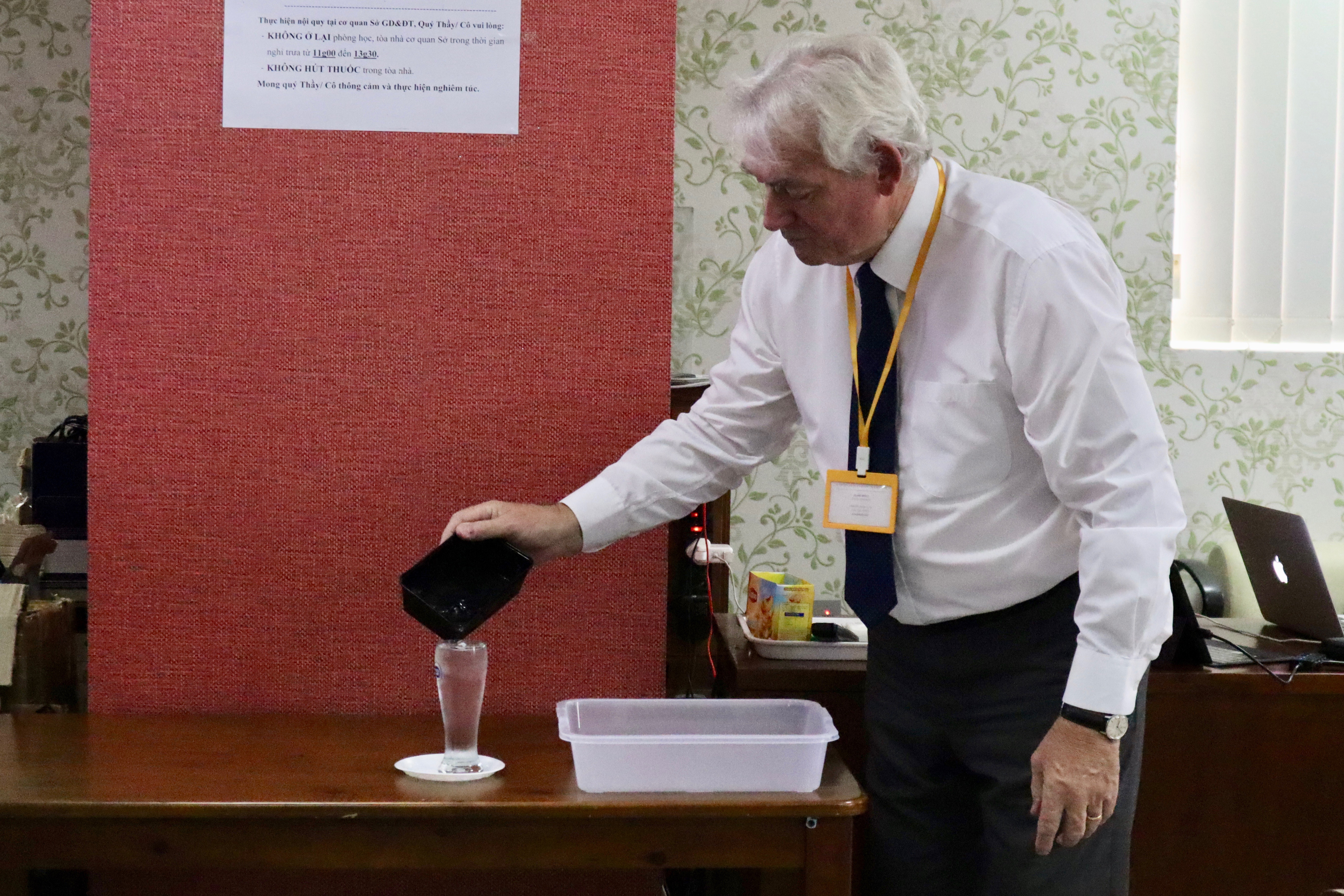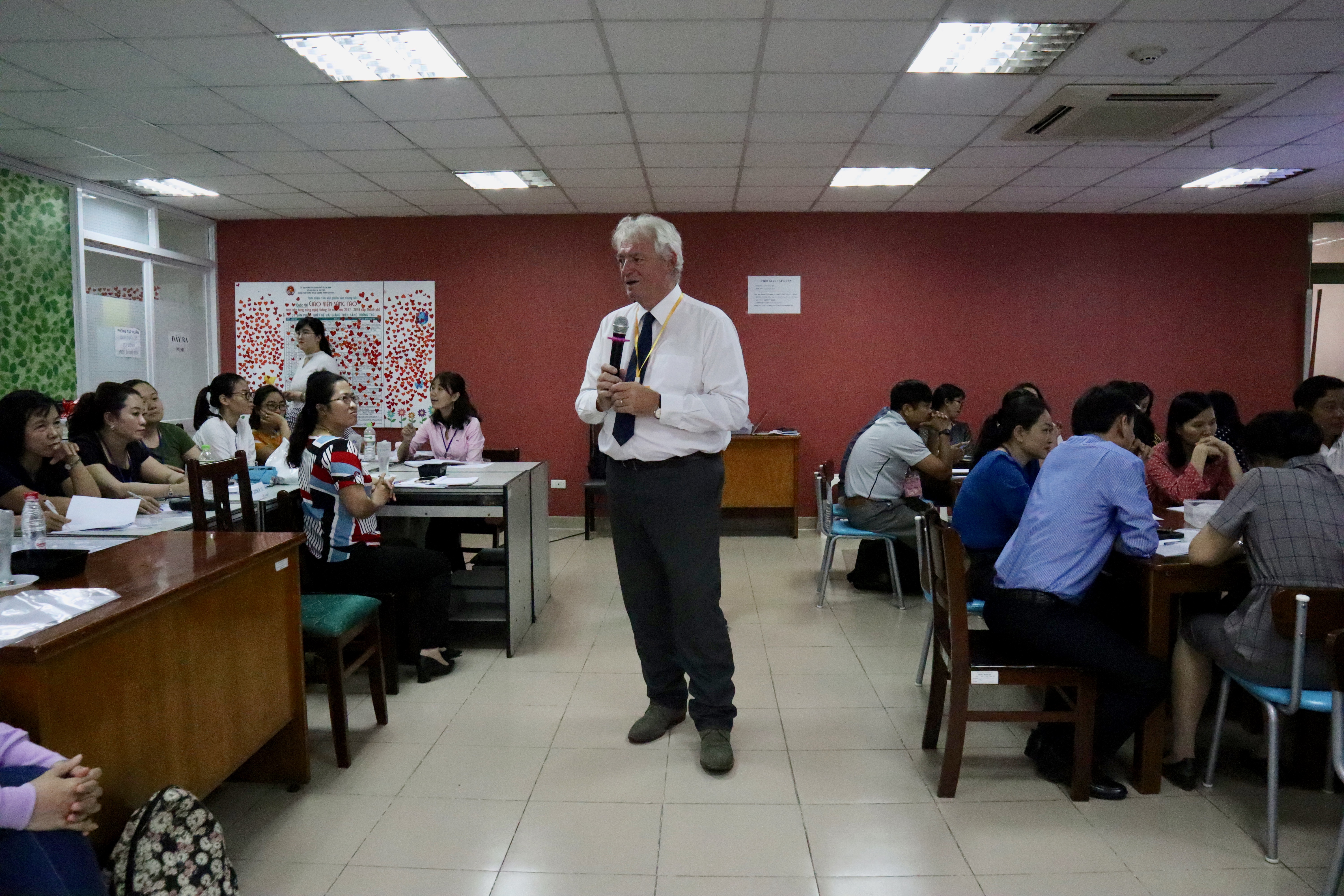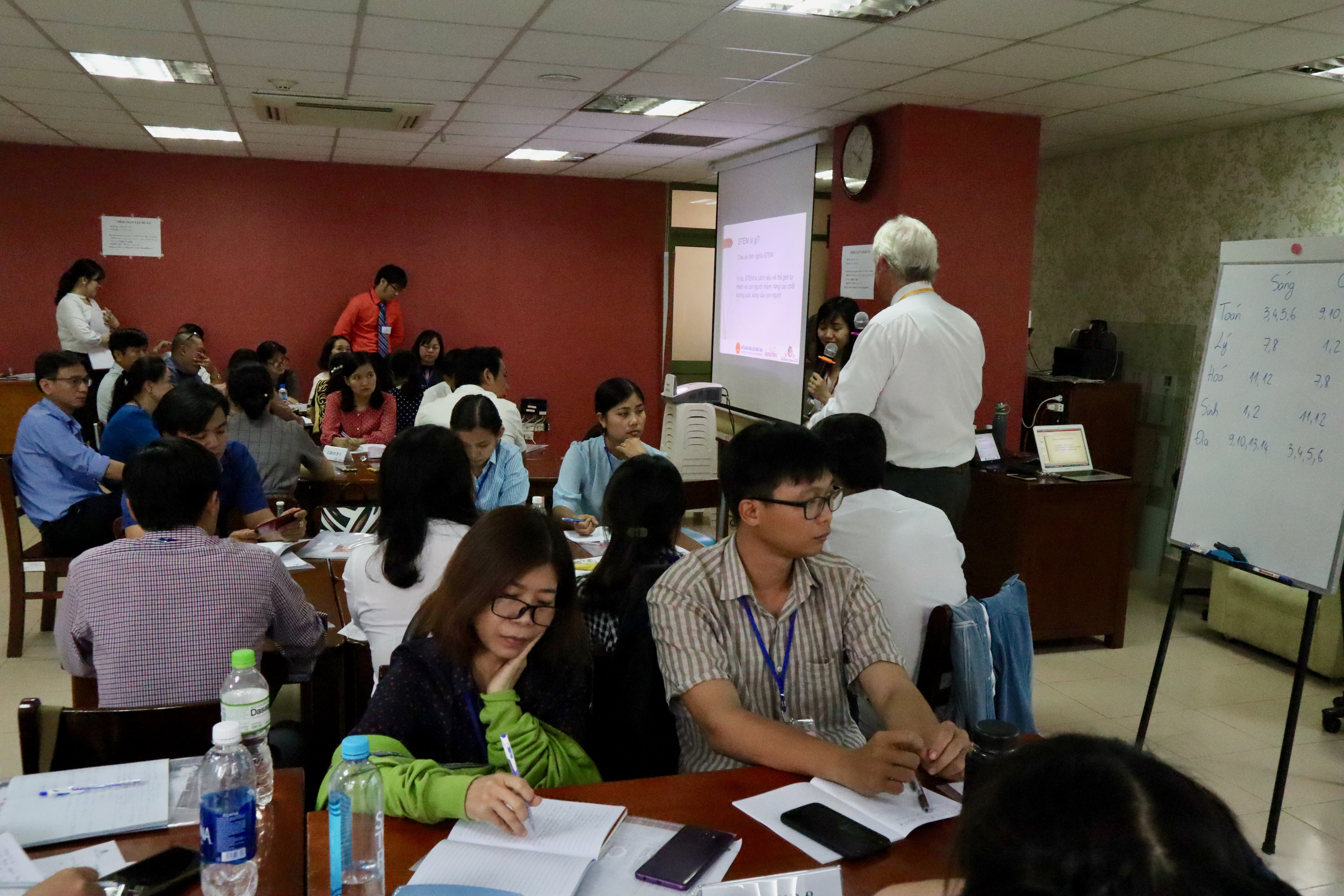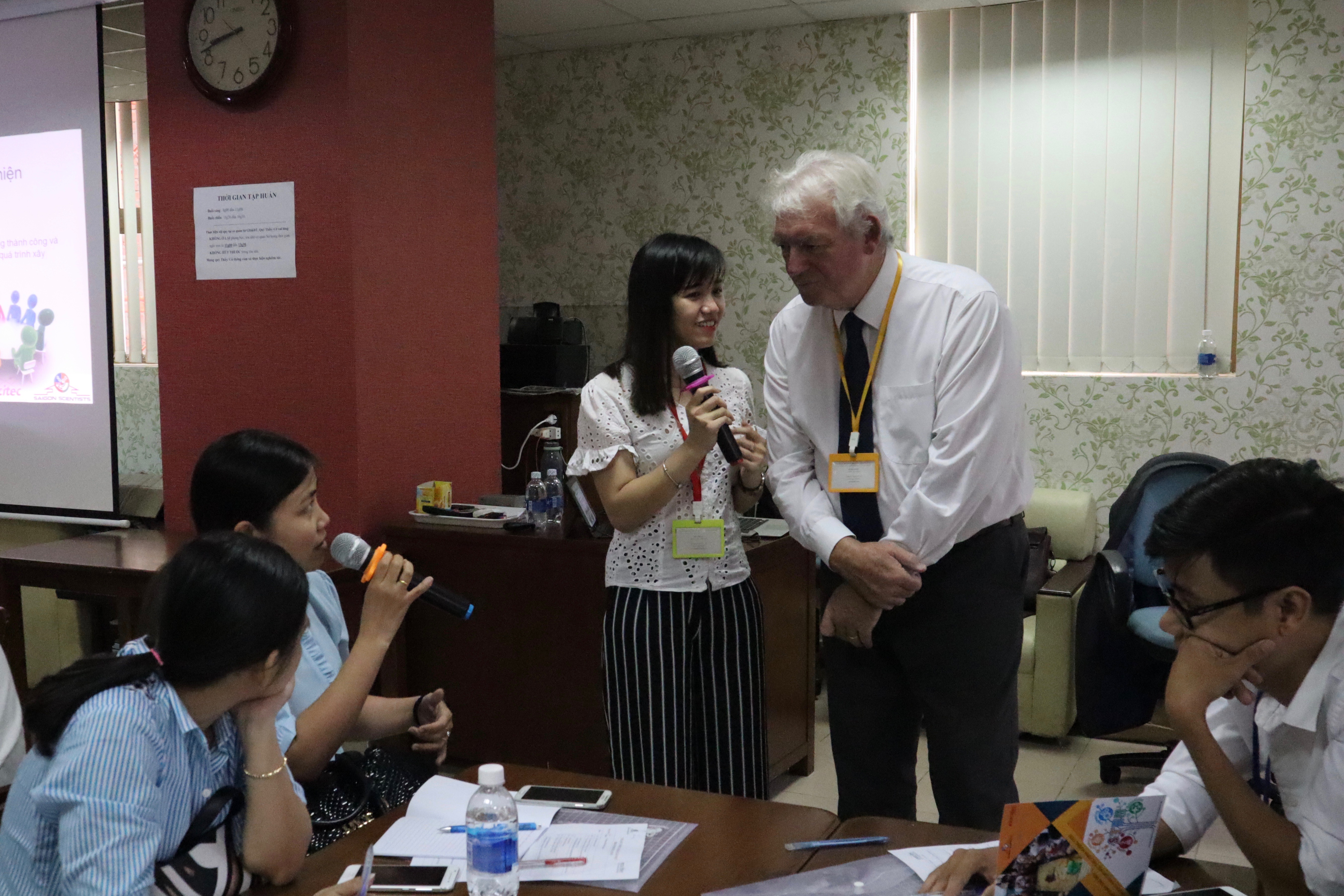Vietnamese textbooks fail to sufficiently stimulate and motivate students, while teachers in Vietnam face several uphill challenges in regard to curricula, a former British teacher has said.
Alan West, chief executive of the British Company Exscitec Ltd., told Tuoi Tre News in an interview that the biggest challenge that Vietnamese teachers meet at the moment are the shortfalls of the current curricula imposed by the Ministry of Education and Training, particularly in that the program does not allow sufficient time for students to do their best in classes.
“This is the main cause for the lack of creativity present at most Vietnamese schools with regard to teaching methods,” the Briton underlined.
West, a former chemistry teacher in the UK, is in Vietnam to introduce a new teaching method to local teachers that aims to increase students’ performance and critical thinking.
|
|
|
Alan West advises Vietnamese teachers on how to help their students convert theory into practice during a training session in Ho Chi Minh City, March 13, 2019. Photo: Ha My / Tuoi Tre News |
Having a good foundation
West has so far worked with nearly 1,000 teachers from Hanoi and Ho Chi Minh City at training sessions designed to help Vietnamese teachers integrate new teaching techniques and approaches into Vietnam’s standard curriculum.
According to the expert, in the UK many teachers do not specialize in the subject they teach, unlike in Vietnam, where a teacher has a specific understanding of the subject they teach.
As a teacher usually teaches only one subject, this allows more flexibility and implementation of the subject’s knowledge into practice thanks to their in depth understanding, West told Tuoi Tre News.
Teachers lacking a sufficient understanding of the material are usually only “one textbook page ahead” of their students, according to the British executive.
He added that without a proper understanding of a subject, teachers cannot be confident in stepping outside their comfort zone and are unable to apply knowledge in practical contexts.
Additionally, because of the long-embedded tradition and mindset that teachers are knowledge providers, many are still lacking in the bravery to say, “I don’t know. How can we find out?”, when they do not have answers to a problem.
“This is an unrealistic concept especially in this tech-driven world,” West said, indicating that it is high time teachers in Vietnam moved from their traditional role to a more modern one.
According to West, teachers should show students how and where to find answers rather simply just regurgitating facts.
“While teachers need to adapt to their new roles, students must also change from being 'passive' receivers of 'given knowledge' to proactive seekers of the knowledge they need to solve problems,” West said.
In Vietnam, succeeding on an exam is usually a student’s ultimate goal, so teachers feel safer by closely following the guidelines of the education ministry instead of going off the beaten track.
“The teachers we have worked with are keen to embrace change but are anxious about teaching situations that are more open rather than prescribed,” the former chemistry teacher elaborated.
Time is also a challenge for teachers – many say there is simply not enough time to stray from the curriculum and ensure that their students are prepared to take different exams.
Pressure also comes from parents who do not yet fully understand the benefits of raising students’ motivation and prefer teachers who spend time focusing on exams to guarantee good results.
Another challenge Vietnamese teachers face, according to West, is a lack of collaboration among schools and teachers.
“We hold these training sessions where teachers from different schools gather,” West explained.
“This is one of the rare opportunities for them to sit down and talk to one another.”
West said his training sessions are a starting point for Vietnamese teachers to share their experiences and offer one another advice.
|
|
| Alan West asks Vietnamese teachers for what they have done in class to help their students covert theory into practice during a training session in Ho Chi Minh City, March 13, 2019. Photo: Ha My / Tuoi Tre News |
Textbooks are slowly changing
While Vietnamese teachers have the full capability to adapt to new, more practical teaching methods, West thinks that Vietnamese textbooks still fail to connect theoretical knowledge with practical contexts seen in everyday life.
This has a negative impact on students as it severely demotivates them, for they do not see why they are learning such knowledge.
This phenomenon is particularly seen in the social science subjects including geography, foreign languages, and history, which have been stigmatized against implementation of new teaching techniques.
Another issue with Vietnamese textbooks, according to West, is that overlapping sections of different subjects are not discussed.
“Right now, this serves as an advantage to us because we can use it to implement new interactive teaching methods and save time,” he said.
“New textbooks are changing, but the process of change is slow,” West commented, adding that new teaching methods focus on improving students’ experience in real time, instead of teachers waiting for changes to curricula and textbooks.
He also noted that the most significant change he has witnessed is putting context before knowledge instead of just providing theories like the books originally did.
One of the best immediate solutions to this problem is for teachers to be more active in taking photos of real-world situations which are related to their lessons in order to provide students with a better context for what they are studying.
For instance, while an electricity transformer is a commonly seen sight on the streets, physics textbooks only provide students with a diagram and they are not aware of what that diagram looks like in reality.
So they cannot visualize how common it is, giving a false impression that this knowledge is unimportant.
While such efforts can significantly change a student’s performance, it should not be too demanding of the teachers, West said.
|
||
Currently, Exscitec is working with the Ministry of Education and Training of Vietnam to implement STEM (Science, Technology, Engineering, Mathematics), a process for solving problems linked to improving human life or understanding it.
The new teaching method is believed to motivate students and boost their performance.
Several pilot programs and training workshops have been conducted in order to instruct teachers on how to provide more stimulating, motivational, and exciting lessons that increase students’ curiosity – a key feature in improving their performance.
The system has already been implemented in UK schools for over three decades and it has been a contributor to positive changes in the curriculum.
Like us on Facebook or follow us on Twitter to get the latest news about Vietnam!




















































